Most people with power hide behind the rainbow flag and figure out ways to oppress everyone else and get away with it. People ask me what the alternative is and I think the beginning of the alternative is to be able to articulate the horrible violence that is happening and not to conform to this sort of “sweatshop produced rainbow flag” vision of normality.
Mattilda Bernstein Sycamore
Download interview in PDF format ![]()
An Interview with Mattilda Bernstein Sycamore
March 5, 2011
Mattilda’s home in Santa Fe, New Mexico
Mattilda Bernstein Sycamore: My name is Mattilda Bernstein Sycamore; we are in Santa Fe, New Mexico at my new apartment. I recently I moved from San Francisco where I was living for the last ten years. I am a writer, activist, editor, social critic, a bit of a troublemaker, and a contrarian. My work is about challenging the violence of the assimilationist gay movement.
Carlos Motta: When and where were you born?
MBS: I was born in Washington D.C., one of the most horrible places in the world without a question. I grew up in the suburbs in an assimilated Jewish professional family. My parents sexually abused me, and their violence was allowed to remain hidden by their success. In many of ways I learned a lot from that about how systemic violence is camouflaged through class, educational and scholarly attainment. I went to a private high school; I was kind of an overachiever high school student. I went to a fancy East Coast liberal arts college, and thought I had finally gotten away, but when I got there I realized that I wasn’t really getting away and that I was just learning how to become my parents; actually to beat them, but I was beating them on their terms by going to a better college than them, doing better in school, being more of an intellectual and being more challenging and critical. I decided I needed to leave after a year and moved to San Francisco in 1992. That is pretty much where I learned my politics, not in the conventional way, but from radicals, outsider queers, many abuse survivors, people running away, activists, drug addicts, poor people, strippers, anarchists and vegans. It was a whole motley crew and we were all kind of a mess, but we tried to figure ourselves out. That is also where I became involved in Act Up.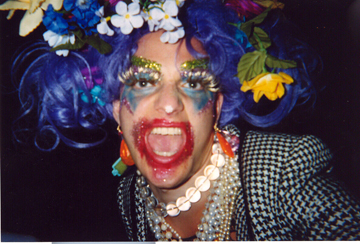
Mattilda Bernstein Sycamore, photo by Jeffery Walls
CM: Let me go back to when you were growing up as a teenager. How did you come to terms with your sexual orientation and gender identity? How did identify yourself and how was it to be sexually diverse in that context?
MBS: Growing up I was called a “faggot” as long I remember. In school the kids would taunt me on the playground. I didn’t even know what that was, I just knew it was something horrible and it was something I didn’t want to be. I knew that set me apart from everyone else. I think people also hated me for being thoughtful, critical, smart or whatever. I think in fourth grade, I realized what a “faggot” was and I was like: “Oh, that is what I am, but how do they know?” I didn’t really understand that what they were seeing was mostly gender not sexuality, but the two were the same in terms of people's prejudices. They were seeing a queeny little boy. I liked to trade stickers with the girls at recess, I didn’t like to play sports, if we played Greek dodge, I would only dodge, and I liked the teachers better than the students. I internalized the message that this was a horrible thing, and I knew that if I ever said I was a faggot, I would never be anything else to my parents or to the teachers. I was still definitely in my parents’ mold of wanting to be really successful in school and really wanting to beat my father in particular.
CM: When you say you internalized it as a horrible thing, do you mean that you were repressing your identity?
MBS: Yes. But more than that, I would say it was that I didn’t want anyone to know. I would try to do things like seeing how guys walked, and I would try to walk like them. I would look to capture poses, have a hand in my pocket, I would practice those kinds of things, but it never worked. No one ever thought I was anything other than a faggot.
When I was fourteen I started having sex with men in public bathrooms mostly at a department store, but also at libraries and other public spaces in D.C. I would go to bathrooms almost every day after school. It was kind of a compulsion; it wasn’t fun, nothing was fun about it. It was something I needed to do and every time I would say: “I’m never going there again.” I knew I didn’t want to feel it; I didn’t want to feel anything actually. I just wanted to be in my head because it felt safer, I could have some control. I would go to the bathrooms and try not to feel what was happening. I guess what I discovered was that it was a secret world. After going there for a few years, I was more able to inhabit my desire, more than just trying to escape it. There were all these hidden rules, you would slide up a pen underneath the stall wrapped in a piece of toilet paper and it said: “Meet me in the stairwell” or “Let’s go to the third floor bathroom.” I had some adventures and weird conversations.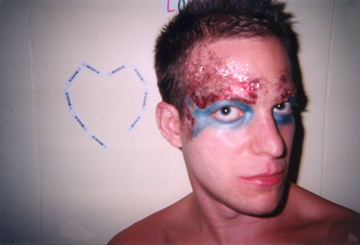
Mattilda Bernstein Sycamore, photo by Jeffery Walls
CM: Did you ever establish affective relationships with any of the people you encountered?
MBS: No. Never.
CM: Did you meet someone that you made friends with?
MBS: No. There were a few people who maybe wanted that. I remember this one guy; he drove me to my father’s office, which is where I would go after school to get a ride home, and he gave me his card. And of course he was a lobbyist! There were people that maybe reached out a little like that, but that was pretty dangerous for someone like that to give a fifteen year old his card.
CM: At what point did you understand that the life that you were constructing for yourself actually had a history and a background? When did you start to think of yourself in political terms and to construct a political articulation of your desire?
MBS: I probably did at the beginning of high school. I realized first that I was never going to belong, and then that I didn’t want to belong with these people who were enacting this kind of violence: The violence of social exclusion, of compulsive masculinity and of class attainment. I didn’t want to be a part of that system and I realized that I didn’t respect my parents on any terms and that I never wanted to have a relationship with them. But of course I had a relationship with them because I was dependent on them, but I didn’t want anything.
I realized that I was really scared in school. I was really introverted and I only wanted to talk to the teachers. I knew that everyone knew I was scared and I thought that I would never find the people that I wanted to meet unless I could show something other than fear. I made a very conscious decision to become more extroverted. I built a kind of a façade and also a sense of invulnerability. If someone called me “faggot,” I would just smile back. The identity I projected then was “freak.” I would also encourage people not care about what other people thought. I encouraged my friends to talk back to their parents and to the teachers. I cultivated that kind sense of self, initially more on the surface, but it ended up actually becoming who I was. But I still didn’t want anyone to know that I was a fag.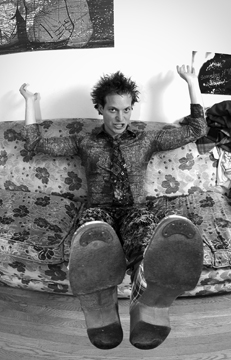
Mattilda Bernstein Sycamore, photo by Jeffery Walls
CM: When did you come out?
MBS: In college, but I don’t know that I came out. It was just like, “Well of course I’m queer.” It was a different environment where there were queer people. My first identity was “queer” specifically. I never did “gay” because I was already a freak and I wanted to be an outsider. I was already politicized then, especially about issues of environmentalism, misogyny, racism and I was very anti-war because it was around the time of the Gulf War. My high school graduation was the day when President Bush started bombing.
CM: How do you identify now?
MBS: If I had to do it in one little statement it would be: “A gender queer, faggot, and a queen, on the trans continuum, in a gender bending, gender blur kind of place.” But the words I relate to the most are probably “faggot” and “queen.” “Queer” would be more of a broader political identity.
CM: Can you describe to me the queer scene that you found in the early 1990s when you started to work politically and your experience with Act Up?
MBS: I discovered in San Francisco a bustling culture of radical queers that really wanted to live on the margins and that consciously chose to not have a mainstream identity, whether that meant education attainment, gay consumerism, or a conventional status.
When I went to San Francisco I joined Act Up (AIDS Coalition to Unleash Power). The point of Act Up was to challenge the violence of government inaction that was enabling people to die of AIDS. Act Up San Francisco had recently split, so there were two Act Up in San Francisco. One of them was Act Up Golden Gate, which was very focused on “treatment activism” or getting drugs into bodies. Act Up San Francisco focused on several different areas: Universal healthcare, needle exchange, prisoners with HIV/AIDS, and women with HIV. There was a really integrated politic where people said: “You can’t fight AIDS without fighting misogyny, racism, classism and homophobia.” It was all tied together.
I met many at people Act Up who had been activists for generations, including people who never acknowledged exactly what they had done, but were surely militant radical activists in the 1970s that probably bombed buildings. But there were also people who had recently graduated from college. Everyone had a very radical and feminist politic. There was this sense, even in mainstream gay culture, that everyone around us was dying, because they were. Especially in San Francisco, this is before the Protease Inhibitors and before there was really any drugs that worked. It was kind of a given that you were going to meet people who were going to die. In Act Up there was no shame about being HIV positive, the shame was on the government, the politicians, the Church, and the demagogues around the world who were facilitating the mass murder of people with HIV/AIDS. 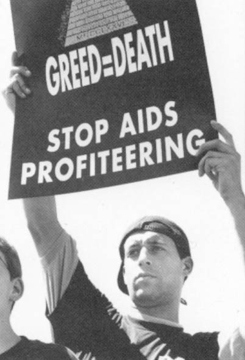
Act Up demonstration at the Int. AIDS Conference in S.F., June, 1990
Photo by Marc Geller. Source: http://aliciapatterson.org/APF1403/Browning/Browning.html
In queer San Francisco, which at that point was very centered in The Mission, it always felt like people were dying. It wasn’t necessarily AIDS, but also drug addiction and suicide, all three of these were very prevalent and it seemed like that was what happened, people died young. Many people who became my queer heroes, or at least people who I respect, I found out about it in their obituaries. David Wojnarowicz is an example, I read his obituary and I was like, “Oh this person sounds great.” “Fags” living on the margins were dying, so there was that urgency around needing to engage in direct action immediately to change the status quo.
There were a bunch of different activist groups at that time in San Francisco and we all worked together. There was Bay Core, a radical abortion rights group, the Women's Action Coalition (WAC), Queer Nation, and Roots Against War (RAW). At one point another group was started by some people who were involved in RAW that challenged the scapegoating of homelessness. This was at the time when “Matrix Program” was in place in San Francisco, which was a precursor to Giuliani’s “Quality of Life,” from which Giuliani learned a lot. The whole idea was to get rid of homeless people in whatever way they could; they put them in jail, shipped them out of San Francisco, shut off certain neighborhoods, hired private security forces, the whole thing. The first action we did was a “Sleep Out” on the mayor’s steps and we all got arrested.
CM: Can you comment on the changes of the LGBT agenda, from the urgency of the queer activist movement you were part of in San Francisco in 1990s to the “politics of assimilation” that you often reference in your work?
MBS: In 1993 the “March on Washington for Lesbian, Gay and Bi Equal Rights and Liberation” took place in Washington. A bunch of us from different Act Ups from all over the country went in order to have an organized civil disobedience action for universal healthcare. It was modeled after the big Act Up actions from the late 1980s. But it was already a very different political climate; Act Up didn’t have as many members anymore, a sense of apathy had started to emerge. We went to The Capitol where it is very easy to get arrested, but it was a very small action and it didn’t get much media attention. A million people from across the country came to the other march, which was so “assimilationist” in so many different ways. The big issue at the moment was “Don’t Ask, Don’t Tell.” It was so telling to me, there we were talking about universal healthcare, which is something that would help everyone in the country, and about AIDS, but that march was organized around gays in the military, the fact that gay people should be able to go abroad and kill people. That was such fundamental hypocrisy.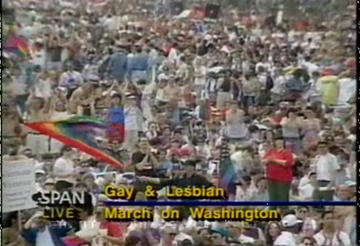
Source: http://www.c-spanvideo.org/program/40062-1
CM: What do you think prompted that change? Was it the fact that Clinton had enacted “Don’t Ask, Don’t Tell” and people were immediately responding to that?
MBS: Yes, but actually I think the change began because Clinton was elected and that made many people completely apathetic, it immediately made people feel like, “Oh we’ve arrived…”
CM: It wasn’t Bush anymore...
MBS: Yes. It was like: “We don’t need Act Up anymore, we don’t need to be on the streets, we need to be in the board rooms, we need to be making policy, he’ll let us into the room, we need to be acting more normal and respectable and aiming for his ear.”
CM: Can you explain what you understand as “assimilation”?
MBS: The message of assimilation is the “We’re just like you” mentality, when gay people say: “We are just like straight people, we have no differences, except for who we might want to have sex with.”
The corner stones of gay assimilation have become marriage, military inclusion, adoption, ordination to the priesthood and hate crimes legislation. As queers we grew up in a world that basically wanted us to die or disappear. I think we shouldn’t grow up and want to become part of that same world and change nothing.
The issue of gays in the military is the most obvious. Instead of saying we want to be part of the military, we should be saying that the U.S. is responsible for more violence in the world than any other country, bombing, terrorizing, plundering indigenous resources, and establishing corporate control everywhere. We should be saying we need to end the military, which is a dominant institution of imperial, colonial and genocidal violence.
I would say the majority of us grew up in the ruins of marriage. Why are we now saying that is what we want? What does marriage mean? For decades, queers had been finding ways to live and love outside of marriage, and with the “assimilationist agenda,” it is all thrown in the trash. 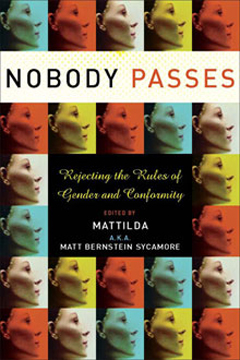
Cover of Nobody Passes: Rejecting the Rules of Gender and Conformity
CM: Do you think these politics of assimilation respond to the fact that the legislative system is heterosexual? What you asking for is a systemic change in terms of the kind of access that we have to the legislative system?
MBS: I think it is very basic. Marriage has become the answer to everything: citizenship, hospital visitation rights, immigration rights, etc. What are they talking about? They are talking only about the rights of people who are able or willing to conform to that institution, which has a history of thousands of years of oppression. People say marriage is going to solve fundamental issues of inequality, but marriage doesn’t solve anything. In fact, the marriage campaign has drained the resources away from everything else.
One thing that is very different now than in the early 1990s is that back then there was a tension between the gay and queer cultures, between assimilation and a liberationist perspective, between a narrow vision of gay identity and a broader vision of fighting racism, militarism and homophobia, all intertwined. Since the 1990s the assimilationist agenda has become much more powerful.
CM: Because it became professionalized, and because activists started to find positions of power within established organizations?
MBS: I think that is part of it. But also, in the 1990s mega rich people like David Geffen and Rosie O’Donnell started coming out and the priorities of the so-called “Movement” became their priorities. For David Geffen maybe marriage is the last thing standing in the way of his full citizenship, but does that matter if you live on the streets, if you just ran away from home, if you lived in an abusive family or if you are trying to figure out who the hell you are? To say to someone, “If you could get married, you’d have healthcare,” is so horribly violent if you don’t even have a place to live.
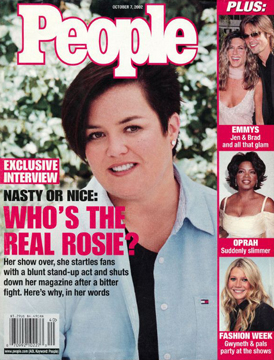
Rosie O'Donnell on the cover of People Magazine
My work is about exposing that violence. Most people with power hide behind the rainbow flag and figure out ways to oppress everyone else and get away with it. People ask me what the alternative is and I think the beginning of the alternative is to be able to articulate the horrible violence that is happening and not to conform to this sort of “sweatshop produced rainbow flag” vision of normality.
CM: And also to insist that there people that do not feel represented by that movement, and that there are people that exist outside of those ideas of what being gay, lesbian, or trans is, don’t you think?
MBS: Absolutely, and also to create more space for people on the margin.
CM: In your work you have talked about the idea of opening up more space for people to live better lives, as opposed to taking away things. Can you speak about that?
MBS: When I identify as “queer,” it is just not about being queer sexually, it is about being queer in every way: It is a way of creating alternatives to mainstream notions of love, who you fuck, what you look like, how you eat, and how you live. I want to be able to challenge the violence that is happening. That is what I learned from “direct action activism.”
I was also involved with Gay Shame, a group that emerged in New York in 1998. Originally what we wanted to do was to create a radical alternative to “Gay Pride.” Instead of having an endless gated procession of corporate floats, we thought we would just invite people for free into a space to share skills and strategies for resistance. We had bands, music, dancing and also people talking about welfare reform, trans liberation, or gentrification in New York. We thought we could make culture on our own terms.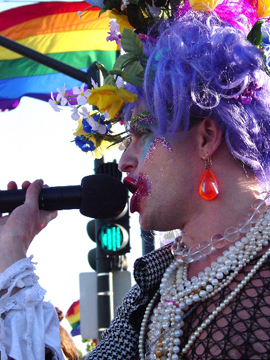
Mattilda at Gay Shame Awards in 2003
Source: http://www.basetree.com/photos/sets/photography20.html
When I moved to San Francisco we started Gay Shame there along similar lines, it was a “direct action extravaganza”; we were committed to challenging the hypocrisy, not just of mainstream gay people but also of all hypocrites. We would throw together these very elaborate events like the “Gay Shame Awards” where we awarded the most hypocritical gay people for their service to the community. We had categories like “helping right wingers cope,” “exploiting our youth,” an “award for celebrities who should never have come out in the first place,” etc. The award was a burning rainbow flag.
What was really interesting about Gay Shame’s actions, was that we wanted create a spectacle. We wanted to create something that used the militancy of Act Up, but fused it with spectacle, to focus on reclaiming the streets in an anti-capitalist, extravagant way, so that people would be drawn in.
CM: I want to ask you about the type of work that you are doing now, the books that you edit, and the novels that you write. It seems like your strategy is to be really vocal and out loud to the media in order to reach a mainstream audience.
MBS: I started writing when I was six years old. Writing for me has always been a way to understand the world and to create a place for myself in it. My anthologies are close to “direct action.” In “THAT'S REVOLTING!: Queer Strategies for Resisting Assimilation” for example, I put out a politic and look at what is happening in the gay world, the assimilation we have been talking about, but also at another world where people are always creating radical alternatives, which are being erased. This is important because our memory is so quickly erased.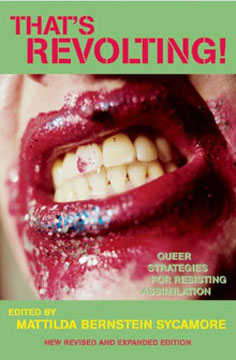
Cover of THAT'S REVOLTING!: Queer Strategies for Resisting Assimilation
CM: Because it is not documented?
MBS: Yes. And if it is documented it is done in ways that disappear and it is not allowed to be in the center. People will remember “Will and Grace” because it is on fucking reruns on TV all the time, but they might not even know about Gay Shame. I want to do document these histories of radical queer activism, but also to have a conversation amongst ourselves, where we don’t have to be justifying our existence to some right-winger or to some gay assimilationist. I want to create a place where we can actually talk about the things that matter.
CM: How is your work received by the official LGBT organizations? Does it resonate in any way or are you turned down as somebody that is too radical, and they don’t pay attention to it?
MBS: I don’t know. I don’t think I ever heard a response from an organization like that.
CM: Perhaps because you might represent an obstacle to what they are trying to achieve?
MBS: Yes, that is my theory too. The mainstream gay organizations, and especially the “marriage agenda” are very comfortable with the Christian right even though it is supposedly their a devout enemy. They are very comfortable because they can win any argument against them. If you have someone who says, “You’re going to burn in hell, all queers are going to burn in hell,” it is a very easy argument to win. It is much harder to win an argument against another person who is queer and says, “Guess what? Actually marriage is not the priority I think we should have as a movement…” I think those organizations very consciously make sure that radical queer opinions are shut out of the media. That conversation is very rare, it happens occasionally, but a radical queer opinion is very marginalized. We don’t have twenty million dollars to spend on a media campaign. 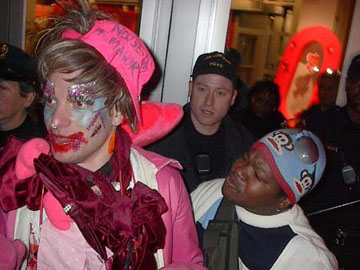
Mattilda at a Gay Shame action in 2006
Source: http://www.moonbattery.com/archives/2006/10/gay_shame_at_th.html
Another thing that I have been really consciously trying to do is to infiltrate the straight left media establishment. The straight left has bought the gay mainstream agenda entirely because they never did their work about anything queer. Now they have realized that it is not really cool to never talk about queer issues, so they have the fucking Human Rights Campaign (HRC), the most right wing gay national organization, on their programs all the time speaking as if that was a left agenda! The left establishment sucked in this entire stupid, insipid and reactionary agenda. I think it is because of homophobia and from their fear of not having done anything for thirty years. They are afraid of saying that the gay marriage movement is a “crock of shit.”
CM: Are you interested in a form of social organizing that may eventually have some kind of policy effect? To some extent the gay liberation movement began at the level of discursive infiltration but it moved towards policy change.
MBS: Unfortunately gay liberation failed. It failed because the original goals, end of the Church, end of the State, end of the nuclear family, end to U.S. militarism, a broad agenda of sexual liberation, none of that has happened. The reason it failed for me is because it turned inwards, it became part of the mainstream and it became part of the institutional structures.
I am not interested in becoming part of those structures in any form. I don’t even want my own structure. I believe in building something on the margins, whatever that means, and I am interested in infiltrating the mainstream media. I am interested in creating our own media structures, I am interested in creating radical alternatives, but not in terms of a narrow policy or legal framework. I think some of those legal battles are important, like the battle against sodomy, the battle to be able to determine your gender identity, or the battle to end to the prison system.
Becoming part of the National Gay Lesbian Task Force (NGLTF) and changing it or something, doesn’t do anything. It will still be an institution that does nothing except take people’s money and speak to the center. I don’t want to speak to the center. I am fine with speaking in the center and saying what I want. I had the opportunity of being on “Democracy Now!” debating with Lt. Dan Choi, which happened because I wrote a scathing critique of Amy Goodman consistently having Dan Choi on and never questioning him. This is the most famous anti-war program in the U.S., and she has this pro-war person on over and over and over again… That was great for me because that is the conversation that never happens. 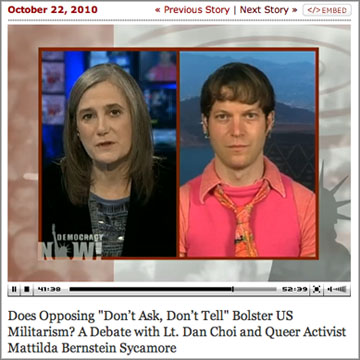
Mattilda on Democracy Now! on Oct. 22, 2010
Source: http://www.democracynow.org/2010/10/22/does_opposing_dont_ask_dont_tell
CM: Did you send her a letter?
MBS: I actually wrote a scathing critique and they responded to it. When a left program speaks about marriage, military, hate crime legislation, etc., they should have a queer person on who is against those things as well, and doesn’t want to strengthen the same racist, classist, homophobic, hideous, violent, criminal legal system…
I received more feedback about that interview on “Democracy Now!” than anything else I have done, including my entire books. In that sense I am totally interested in being on those programs and debating, having an actual conversation between queers about the issues that supposedly mattered to queers, instead of having a straight homophobe debating a gay person, or a single gay person talking.
It is a cliché in a way to think that the margins determine the center, but it is true. If there are no margins, the center will never change. I guess the question is: “How do you create space without becoming part of that same structure, like the gay establishment has become?”
Weblink: Mattilda Bernstein Sycamore's website
↑Top
